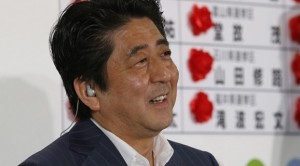TOKYO, Japan—A government panel will urge Japan to allow its military to help allies that come under attack, in a major reversal of the country’s ban on collective defense under its pacifist constitution.
The panel is expected to present its near-final draft recommendation later Tuesday.
Prime Minister Shinzo Abe wants Japan to play a greater role in international peacekeeping and step up its defense posture, citing potential military threats from China and North Korea.
The 14-member panel, headed by former Ambassador to the United States Shunji Yanai, says the revision is possible if the government alters its current interpretation of the war-renouncing constitution. Formal constitutional change involves high hurdles, though Abe eventually hopes to achieve that.
The constitution, written under U.S. direction after World War II, says the Japanese people “forever renounce war as a sovereign right of the nation” and that “land, sea and air forces, as well as other war potential, will never be maintained.” The government has interpreted those clauses as meaning that Japan cannot possess offensive military weapons such as Intercontinental ballistic missile or long-range strategic bombers.
Abe and other supporters of the change believe that restrictions should be removed from the military, and that Japan’s current self-defense-only policy is inadequate as the region’s security environment becomes more challenging. They say there may be instances in which Japanese troops have to fight for allies during international peacekeeping missions, even when Japan is not attacked directly.
Japan’s peacekeeping missions have been limited to noncombat roles because of its pacifist rules, and a change would allow its troops to do more.
The draft report will also urge Japan to relax its restrictions on arms exports, participate more actively in United Nations-led security operations, and prepare a legal framework for its military to counter intrusions on remote Japanese-held islands, apparently including territory in the East China Sea also claimed by China. It would also stress the importance of strengthening Japan’s defense ties with its allies, most importantly the United States.
Government officials say the panel’s final report is expected in April.
RELATED STORY
Japan set to buy $240B worth of hi-tech weapons



